List of political parties in Bamvango
Jump to navigation
Jump to search
This article lists political parties in Bamvango.
Parties with parliamentary representation
| Party logo | Party name | Acronym | Leader | Parliamentary Assembly seats | Ideology | ||
|---|---|---|---|---|---|---|---|
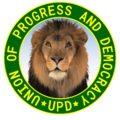
|
Union of Progress and Development | UPD |  Anthony Benoudjita |
45 / 105
|
|||
| The UPD was formed in 2001 by former foreign minister Anthony Benoudjita to challenge the administration of Abdallah Ibrahim. It was the main opposition party during the 2000's but went into exile in 2009. The UPD returned to the political scene in 2014 following the overthrow of Ibrahim winning the 2014 election which saw Benoudjita become president and has remained the largest party since. It mainly is supported in the southeast of the country. The UPD is the main member of the governing Democratic Rainbow Alliance. The UPD supports liberal and social-democratic policies. | |||||||
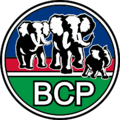
|
Bamvango Congress Party | BCP |  Lawrence Kabadi |
18 / 105
|
|||
| The BCP was founded in 2014 by former members of the Bamvangan Popular Renewal Organisation who opposed former-president Ibrahim. Its leader Lawrence Kabadi was formally vice-president under the deposed president. The party is generally supported in the northwest of the country and supports conservative policies. | |||||||
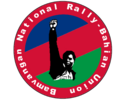
|
Bamvangan National Rally-Bahian Union | BNR-BU |  Nyandeng Deng Akech |
12 / 105
|
|||
| The BNR-BU is the oldest party in Bamvango being founded in 1944 by Johnathan A. Akech to oppose colonial rule under Estmere. The BNR-BU played the primary role in securing the independence of Bamvango and governed the country under Akech from independence to Akech's overthrow in 1962 after which it entered into exile. The BNR-BU would return to the country in 1991 but was a shadow of its former self and has been an opposition party since. The party originally was more of a big tent anti-colonial party but following independence became left-wing supporting Pan-Bahianism and Bahian socialism. The party is mainly supported by ethnic Welke people and is led by Akech's granddaughter Nyandeng Deng Akech. | |||||||
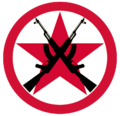
|
Patriotic Front-Arman | PF-A | File:Atiku Abubakar.jpg Mosaab Arman |
12 / 105
|
|||
| The PF-A is one of the two organisations - the other being the Patriotic Front-Kuol Arop - that claims to be the legitimate representative of the Patriotic Front for the Liberation of Bamvango, the rebel group that successfully overthrew the Ibrahim regime in 2014. Following Ibrahim's overthrow the PF emerged as the second largest party and entered coalition with the UPD. However Kuol Arop left the coalition in 2017 to take up arms against the government leading to a faction based around Mosaab Arman to break away in support of the Benoudjita government. The PF-A is part of the governing Democratic Rainbow Alliance. | |||||||

|
Way of Irfan | WOI |  Daoud Bashir |
5 / 105
|
|||
| The WOI was founded in 2014 in order to represent the Irfanic community in Bamvango, with critics accusing it of being linked to the Zorasani government. The WOI joined the governing coalition in 2017 and as such participates in the Democratic Rainbow Alliance. Its support mainly is located in the northwest of the country. | |||||||
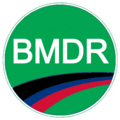
|
Bahian Movement for Democratic Reconstruction | BMDR |  Solomon Kerallah |
4 / 105
|
|||
| The BMDR was founded in preparation for the 2019 elections by Solomon Kerallah, a businessman who had been a member of the UPD before becoming a of Benoudjita. The party is accused of mainly being a vehicle for Kerallah who has been accused of demagoguery and populism. It is mainly supported by former UPD supporters. | |||||||
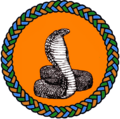
|
Bamvangan Popular Renewal Organisation | BPRO |  Gabriel Jerbo |
3 / 105
|
|||
| The BPRO is the successor of the Bamvangan People's Revolutionary Organisation which overthrew the regime of Kashim Shehu during the Bamvangan Bush War of 1982-1988. The BPRO was the ruling party of Bamvango from 1987 to 2014 under the leadership of Abdallah Ibrahim who ruled in an authoritarian manner. The BPRO was thus the dominant party during this period maintaining power through electoral fraud and violence. The BPRO collapsed alongside Ibrahim's regime in 2014 but still maintains support amongst Ibrahim's core supporters amongst the Begi ethnic group. The BPRO is currently led by former foreign minister Gabriel Jerbo. | |||||||
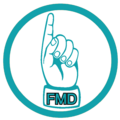
|
Forum for Multi-Party Democracy | FMD |  Hama Monguno |
1 / 105
|
|||
| The FMD was formed in 1991 as the main opposition party to the BPRO, mainly consisting of former members of the Shehu regime. It was considered to be the main opposition party in the country until 2001 when the UPD gained that role. The FMD was widely perceived to be supportive of Ibrahim's government and thus was not considered to be part of the real opposition. The FMD lost all their seats in the 2014 election mainly to the Patriotic Front and subsequently have remained a minor force. Their long-term leader is Hama Monguno who served as Agriculture Minister under Shehu. | |||||||
Alliances
| Party logo | Party name | Acronym | Member parties | Parliamentary Assembly seats | Ideology | ||
|---|---|---|---|---|---|---|---|

|
Democratic Rainbow Alliance | DRA | Union of Progress and Development Patriotic Front-Arman Way of Irfan |
64 / 105
|
|||
| The Democratic Rainbow Alliance was created in 2019 in order to support president Anthony Benoudjita's re-election bid. It consists of three parties - Benoudjita's Union of Progress and Development, the Patriotic Front-Arman and the Way of Irfan as well as a handful of opposition members of parliament. The DRA currently holds a majority in the Parliamentary Assembly. | |||||||
Unrepresented parties
| Party logo | Party name | Acronym | Leader | Ideology | |||
|---|---|---|---|---|---|---|---|

|
Patriotic Front-Kuol Arop | PF-K |  Oscar Kuol Arop |
||||
| The PF-A is one of the two organisations - the other being the Patriotic Front-Arman - that claims to be the legitimate representative of the Patriotic Front for the Liberation of Bamvango, the rebel group that successfully overthrew the Ibrahim regime in 2014. Following Ibrahim's overthrow the PF emerged as the second largest party and entered coalition with the UPD. However Kuol Arop left the coalition in 2017 to take up arms against the government leading to a faction based around him to break away from the government. The PF-K currently exist as a rebel group fighting the Bamvangan government. | |||||||
Former parties
| Party logo | Party name | Acronym | Leader | Formed | Dissolved | Ideology | |
|---|---|---|---|---|---|---|---|
| Bamvangan Section of the Workers' International | BSWI | 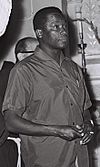 Wade Dimtolaum |
1935 | 1950 | |||
| The first political party in Bamvango the BSWI was formed following the Great War to campaign for the independence of Bamvango. Under the charismatic leadership of Wade Dimtolaum the BSWI became strong within the trade union movement but was as a result repressed by both colonial authorities and traditional leaders who still held enormous sway in Bamvangan society. The party was banned in 1940 but subsequently emerged following independence in 1946 by which time much of its support had shifted to the more moderate BNR-BU. It was banned in 1950 when Akech instituted the single-party state with Dimtolaum going into exile. | |||||||

|
North Bahia United Party | NBUP |  Nelson Bakary |
1942 | 1950 | ||
| Formed in 1942 to contest the colonial legislative seats, the NBUP advocated for a peaceful path to independence with Estmere. It was a moderately conservative party that was able to appeal to traditional forces in society that supported independence for Bamvango but were opposed to the more radical solutions of parties such as the BSWI. The NBUP however were less popular then the BNR-BU whose platform of more immediate independence and sweeping reforms were more popular then the gradualism of the NBUP. The party dissolved in 1950 following the imposition of the single-party system. | |||||||
| Republican Federation | RF | 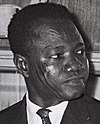 Armel Yombandje |
1970 | 1977 |
| ||
| The Republican Federation was founded in 1970 following president Joshua Ngakoutou's decision to cede power to a civilian administration, picking former minister Armel Yombandje to become president. Yombandje subsequently formed a single-party state with the RF at its centre. Although the RF started out as a cross-ethnic party that sought to bring together military and reformist elements it soon became a vehicle for Horo supremacy. The RF was dissolved in 1977 following the overthrow of Yombandje. | |||||||